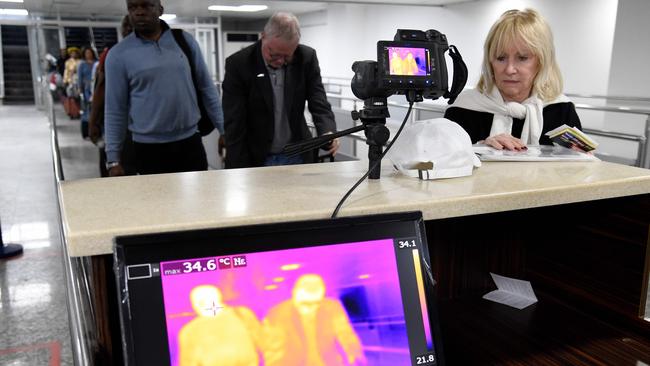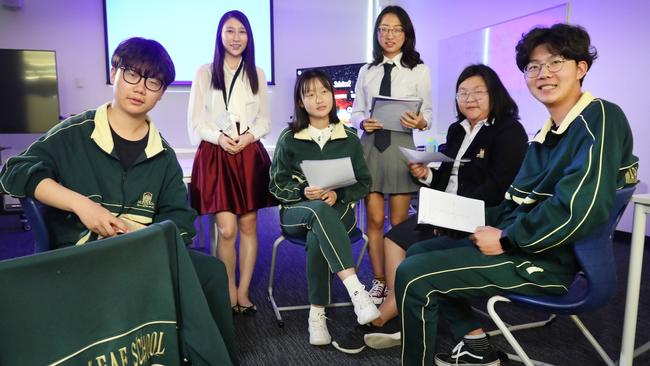Adelaide schools ban students returning to school from China for two weeks
At least two Adelaide schools have taken steps to protect students from deadly coronavirus which has killed more than 80 people in China and has been spreading globally.
National
Don't miss out on the headlines from National. Followed categories will be added to My News.
- Adelaide residents tested for killer virus from China
- Coronavirus patients who caught disease did not visit China
School down to 10 students also closes for fortnight – scroll down
- Subscriber deals for The Advertiser
Schools are ignoring official advice and taking control of the deadly coronavirus into their own hands, banning students returning from China from classrooms for up to two weeks.
As Australian health authorities monitor the virus outbreak in Hubei Province China, Pulteney Grammar and Seymour College have urged families to wait it out at home for the incubation period of the organism – thought to be between four and 14 days.
Six people in SA are currently awaiting test results for the deadly virus, although SA Health has assured the public the chances of a positive result were low.
Messages began circulating to parents on Sunday as schools implemented measures, with Blackfriars telling parents: “If you have visited the Wuhan district of China during the holidays, we ask that you refrain from sending your children to school until they have been back in Australia for at least 10 days”.
In an email to students from Pulteney principal Cameron Bachelor on Monday, he stressed the Education Department had not recommended the stay-at-home policy.
“If you have visited China during January, we ask that you exercise the advised caution and refrain from sending your children to school until they have been back in Australia for 14 days,’’ the email states.
But the emergency measures have drawn sharp rebuke from the Federal Government, which says the isolation measures are not necessary.
Federal Education Minister Dan Tehan told ABC radio only if a student had been in contact with somebody with coronavirus, should they be kept at home for up to 14 days.
The email from Mr Bachelor states: “As school starts on 28 January, your child will need to have been back in Australia by 14 January to commence school on 28 January.

“If they arrived back in Australia after 14 January, they should not commence school until 14 days after their arrival back in Australia.”
Adelaide’s elite schools have a significant proportion of Chinese families, some of which visited their home country during the summer holidays.
Walford school parents have been told the situation is being monitored, but no action has yet been taken, with boarders returning from China being checked.
Pulteney’s letter to students from principal Cameron Bacholer was in English and Mandarin.
“At present, there are no identified cases in South Australia,” Mr Bachelor’s email states.
“Pulteney Grammar School will continue to monitor the situation and follow the advice of SA Health and other government agencies and will always act in the best interests of student safety with prudence and precaution.
“It is the right and duty of all parents to act in what they believe to be the best interest of their children.”
A federal Education Department spokesperson said it was working with the health department to implement measures to manage the risk of the coronavirus.
“Border measures are already in place to detect travellers who are unwell coming into Australia, this will include international and returning domestic students travelling to Australia to commence or resume their studies,” a spokesperson said.
“We will continue to monitor the situation very closely and will respond based on the best available evidence and advice.”
Health Minister Greg Hunt on Tuesday said authorities would follow the medical advice “without fear or favour”.
“If the medical advice is that stronger action is needed, the Prime Minister, the cabinet and the national security committee will adopt that immediately,” Mr Hunt said.
“There is a national medical stockpile of 12 million (masks) in addition to those that were provided for bushfires … and we will work to make sure that everybody who needs them, has them.”
Australia’s chief medical officer Professor Brendan Murphy said it was important that GPs put a mask on patients, staff and the doctor when they are assessing people suspected of having the virus.
“People who have come from China should be treated like any normal member of the community unless they develop symptoms of fever, flu-like symptoms which could suggest this virus,” he said.
“If they’re unwell they must wear a mask and ring their GP or emergency department.”
Professor Murphy said every day there were a number of cases that met the definition and he expected there would be more positive test results to come.
Meanwhile, on Tuesday afternoon, SA Health announced a further three people in South Australia were being tested for coronavirus – bringing the number of people waiting for test results in the state to six.
It follows one person receiving a negative test result on Tuesday morning.
SA Health said the likelihood of the new patients testing positive to the virus was low.
“We continue to work closely with the Commonwealth Department of Health and Health Departments in all jurisdictions, as well as local GPs, to monitor the situation closely and provide support as required,” the department said.
All of the people under investigation are being managed using standard infection control protocols.
South Australian universities are also racing to deal with the deadly virus.
A University of South Australia spokeswoman said it has prepared health advice for students and was working with the university medical clinics at its City West and City East campuses.
“The University has convened a senior response-management team which is currently assessing any impact from the virus and is able to activate appropriate response plans if required,” she said.
Flinders University is also working with state authorities to ensure the health and safety of its students and staff.
Meanwhile chemists and face masks stockists across central Adelaide are being inundated with sales and inquiries about face masks as news of the coronavirus spreads.
Chemist Warehouse in the Myer Centre have completely sold out of face masks and won’t be able to restock for sometime due to their main supplier being sold out.
Staff at Japanese variety store in the Myer Centre, Daiso Japan, said at least 50 people today have inquired about the masks, but they too are sold out.
Kawaii Japanese retail store on King William St have also sold out.
A staff member told The Advertiser they sold out in three days and it would be “tricky” to get more anytime soon due to deliveries coming from Japan.
miles.kemp@news.com.au
Maple Leaf School closes for a fortnight
A private school for Chinese international students in Adelaide’s north has closed for a fortnight over coronavirus fears, but it has a bigger problem.
In just its second year, enrolments at the Maple Leaf School housed in UniSA’s Mawson Lakes library have plummeted from 30 to no more than 10, throwing the viability of the venture into doubt.
When it was announced in 2018, Maple Leaf’s plan was to launch at Mawson Lakes but soon build a permanent school at UniSA’s Magill campus for 500 students.
Principal Steve Bousfield said students would be putting themselves at risk by travelling now.
“Even if kids are from safe areas, they (generally) have to go through Guangzhou to get here,” he said.
There are direct Guangzhou-Adelaide flights, but the Chinese city is in Guandong province, which has had the second-most coronavirus cases behind Hubei province, where the outbreak originated in the city of Wuhan.
Students are being helped to begin their studies online, with the aim of them flying into Adelaide in time to head back to school on February 10.
“By that time there should be more stringent control measures in place,” Mr Bousfield said.
“But you never know, things could be even worse.”

Maple Leaf is China’s biggest operator of international schools, mostly in China itself using a Canadian curriculum, with tens of thousands of students. The bilingual Adelaide school, where most classes are taught in English, was its 88th and first in the southern hemisphere.
Mr Bousfield said Maple Leaf enrolments in its Chinese schools were “not as strong” as they had been, so the company was more focused on them than its offshore ventures.
He said there was a contract in place with UniSA until the end of the year, when the school would be reviewed.
“I wouldn’t know at this stage whether it’s going to be viable or not,” he said.
Parents pay $20,000 a year for tuition and $1600 a month for kids to live with local families, many in Mawson Lakes itself.
Subjects on offer include maths, physics, business and economics.
The original intention had been to attract students from India and Russia as well as China, and Australians of Chinese heritage.
UniSA said it was “working closely with Maple Leaf School to ensure the safety and well-being of all students who have enrolled in the pilot school”.
“UniSA supports Maple Leaf’s decision to delay the commencing term on-campus start date in response to the impacts of novel coronavirus, and the school’s intention to provide lessons online for the start of the year,” it said in a statement.
“The school at Mawson Lakes was established as the first Australian pilot of the Maple Leaf Educational Systems schools, through a cooperative agreement with UniSA. The university provides support services to students who choose to undertake their future tertiary studies with UniSA, such as access to apply for international merit scholarships, program and career information sessions and pathway advice.”
Originally published as Adelaide schools ban students returning to school from China for two weeks
